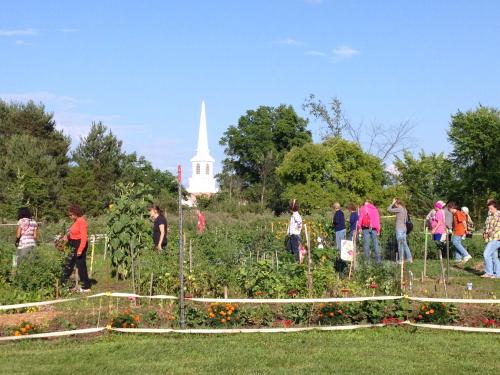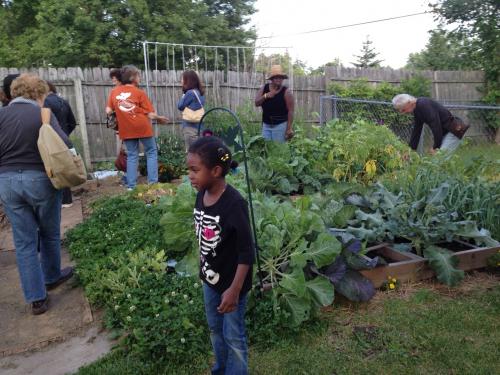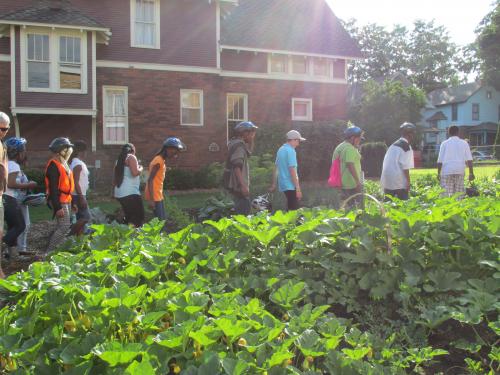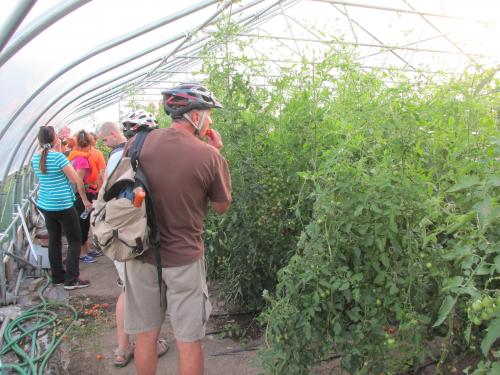Flint Michigan area urban agriculture report – July 31, 2014
A mid-summer cool period is delaying the development of vegetable crops in urban and semi-rural small scale diversified farm fields, hoop-houses and market gardens. In Flint, the edible flint Food Garden Tour showcased 16 areas urban farms and gardens.
Weather
According to the Michigan State University Enviro-weather station in Flint MI, temperatures for the past week ranged from a 50.6 degrees Fahrenheit low to an 82.8 F high. We are at 1,572 GDD base 50 (Growing Degree Days), which is now several days behind normal for this time of year. Crops are a bit delayed in their development due to our cool summer. The rainfall total for the year is 18.04 inches – we had .62 inches of rainfall this past week, which was appreciated by growers and their crops. Most growers have been surprised by how quickly soils have gone from too much to too little moisture in the past month.
Crop Reports
According to research conducted at the MSU Hoop-houses located at the Student Organic Farm and educator observations from the field, many crops are ready for early harvest due to season extension technology. In area hoop-houses August is the month to plant cool season crops for fall. This week’s rain delayed some grower’s last summer and first fall succession plantings back at least a week in the field.
Going to area markets now
According to a Michigan State University Extension food systems educator, growers are harvesting cherry tomatoes, tomatoes, bell peppers, cucumbers, kale, basil, lemon balm, thyme, oregano, rosemary and chives from hoop-houses. From the field, the last of the snap peas, onions (to be dried and cured), green and wax beans, broccoli, collards, Swiss chard, parsley, zucchini and cut flowers are being harvested.
Flint food garden and farm tour
The sixth annual edible flint Food Garden Tour was held on Wednesday, July 30, and 350 participants took busses or rode bikes to view 16 innovative and inspiring food gardens and farms in the Flint area. Tour participants learned how producers are tackling the challenges and opportunities of urban food growing. Some of the techniques on display were different trellising systems for vine-type vegetables, rain water catchment and irrigation systems, the making and using of compost tea, square foot gardening, the use of hoop-houses for season extension growing; permaculture and urban homesteading practices, no-till lasagna gardening, non-herbicide weed management practices and demonstration gardens incorporating inclusion and accessibility gardening techniques. Some of the gardens and farms grow and sell their produce at the Flint Farmer’s Market, while others sell to downtown restaurants. One garden, located at a homeless shelter, provides fresh vegetables for their residents’ daily meals. Many of the community gardens sponsored by schools, churches and neighborhood groups designate a portion of their bounty to share with senior centers, neighbors and volunteers, increasing local residents’ access to fresh food and transforming neighborhoods by improving public safety. Participants strongly agreed that the Food Garden Tour helps build civic pride and community goodwill.
Carriage Town Ministries garden. Photo by Terry McLean | Michigan State University Extension

The Seeds of Hope garden. Photo by Terry McLean | Michigan State University Extension
Flint River Farm. Photo by Terry McLean | Michigan State University Extension

The Grand Experiment garden. Photo by Terry McLean | Michigan State University Extension



 Print
Print Email
Email






